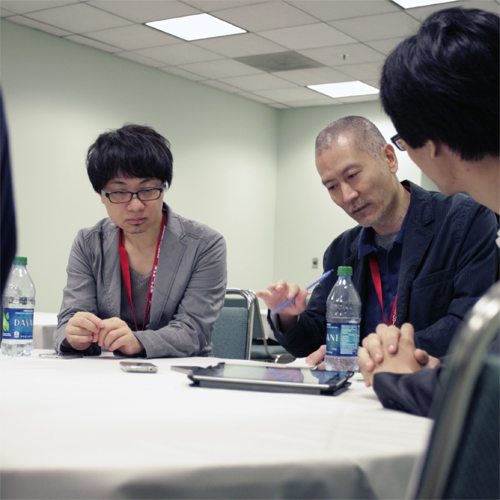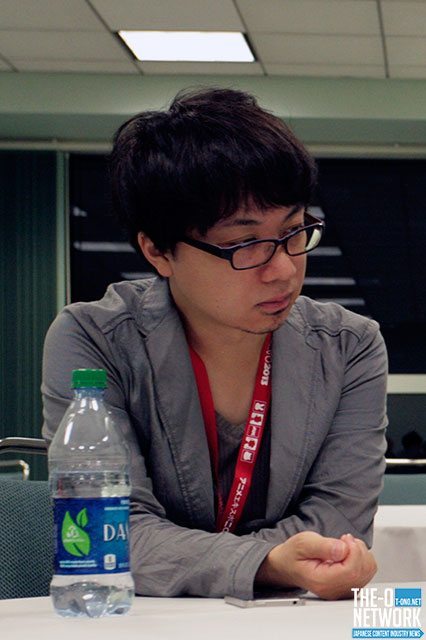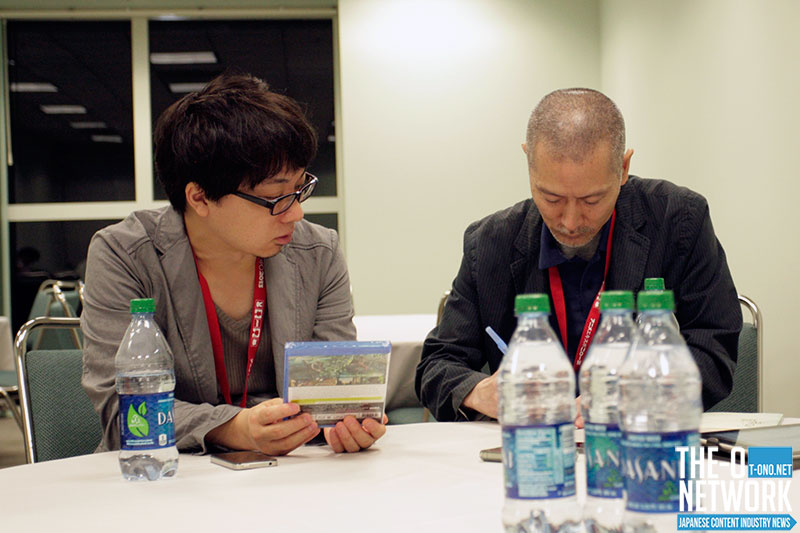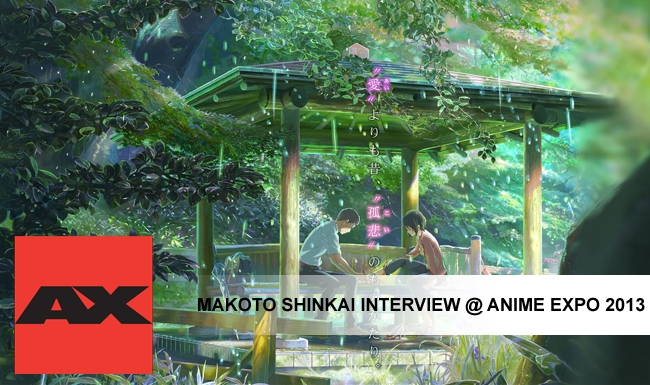While at Anime Expo 2013, our incumbent editor-in-chief, Theodore Mak, got the privilege of interviewing renown anime director Makoto Shinkai to ask him a few words about his latest film Kotononoha no Niwa (trans. the Garden of Words). The film itself was recently released earlier this month by Sentai Filmworks in English on Blu-ray and DVD. Find out what the masterful visionary had to say regarding his newest forty-six minute film.
T-ONO: How have you enjoyed an American convention so far?
Shinkai: Although this is my first time here [at Anime Expo in Los Angeles], I've been to Otakon, Comic Con, Japan Expo in Paris and several other conventions across Asia. I actually just arrived earlier today so I haven't really had a chance to check out the convention yet; however, compared with the Japanese conventions and events, I've noticed that [almost] everyone cosplays all the way throughout the halls. It makes me happy to see people here being very relaxed and having fun enjoying Japanese animation.

T-ONO: What was the original inspiration behind your latest work, The Garden of Words?
Shinkai: I first came up with this idea on May 2012, which was almost one year ago. Incidentally during that month, we had a lot of rain going into the rainy season [June] in Japan and I came up with the idea of wanting to create a film about a boy having a meeting underneath a roof.
T-ONO: In The Garden of Words, there is a large emphasis on shoes and shoe design in the story. Was there a lot of research and preparation that you had to do before you started working on the feature?
Shinkai: There are two important factors/elements in the story: shoe and shoe making and Manyo poetry, which in Japan is a very old style of poetry. Since contemporary Japanese people aren't too familiar with these two elements, I had to do a lot of research ahead of time on these topics.
T-ONO: A lot of the backgrounds in the movie appear to be inspired by Shinjuku Park. Can you tell a little bit about why you decided to choose it as your setting?
Shinkai: Over the last ten years, I have been living in the Shinjuku/Shibuya area where we can see the signature skyscrapers of Shinjuku. Although I moved around the area four or five times, it was always an iconic landmark that stood out to me- that's why I chose to use Shinjuku as the setting. It's an area that I really love and I was always watching the skyscraper scenery from my room.
From my room, I could tell that there are hundreds and thousands of windows. Each window felt like a unique tunnel that would let me look at the people living there. Also whenever I looked down, there's a neon-like city, for example the Kabukichou area. I was so impressed by each of the individual stories of the people, it made me feel really connected to the area.
T-ONO: Was The Garden of Words always intended to run for about forty-six minutes or was it originally designed to be longer?
 Shinkai: Honestly, I was always thinking about creating a film that was less than sixty minutes. Actually, I was originally thinking about something that would only be about thirty minutes, but as I was writing the script and doing the storyboards it naturally reached forty-six minutes long.
Shinkai: Honestly, I was always thinking about creating a film that was less than sixty minutes. Actually, I was originally thinking about something that would only be about thirty minutes, but as I was writing the script and doing the storyboards it naturally reached forty-six minutes long.
Once the film reached its full-length, the producer and I were talking about how we wanted to release it. We did think that it might be a little bit short for a theatrical release, so that was a little bit of a challenge.
I never thought about making it longer, like sixty or ninety minutes. It didn't make any sense to extend the work just so that we could release it in the theater. We decided to release the film as it was, and fortunately the distributor Tohou called and decided to do a nationwide release.
[Unlike my other films], I wanted to do something different so I decided to release it on Blu-ray and on iTunes. It was different, but I wanted everyone to enjoy it. That way people who could make it to the theater could enjoy it, [in addition] to those who couldn't make it. Also, people who enjoyed it in the theaters would be able to either purchase it or download it and bring it home with them. That was a very unique idea that we had.
T-ONO: Your previous works, including The Garden of Words, have all been very popular. Do you have any plans or ideas for any future films?
Shinkai: I honestly haven't given much thought towards my next project since The Garden of Words is still being shown at the theaters in Japan. Every time I release a new work, I tend to watch and study the audience's reactions and impressions. It takes time, maybe a few months or even up to a year [before I start working on another project]. I check to see how the audience responds and then I come up with the next story. As of now, I don't really have any specific ideas yet.
T-ONO: The Garden of Words was a technical improvement over your last film The Children Who Chase Lost Voices. Is there anything, production-wise, that you are looking to improve or evolve upon for your next film?
Shinkai: That's a really hard question to answer as the technique really depends on the content of the next film. If we were to compare it to cooking, the content would be what's on the dish and the technology would be the dish itself. The preparation will be different according to the dish that I personally decide to make. It could be a traditional-Japanese like bentou box or it could be something different. It could very well be that my next film doesn't require a very complicated technique.

T-ONO: What kind of message would you personally like for American audiences to take home with them after watching The Garden of Words?
Shinkai: [Laughs] That's another difficult question. As you know, we will be having our first screening today at Anime Expo, so I don't really know what to expect. Let's see though, first of all I really like the Shinjuku area, the gardens where I frequently go, the rain in Japan and Manyo poetry. I also like the relationship between teacher and student in Japan. These are all things that I find to be beautiful and familiar with in Japan. I am very curious to find out how these will be appreciated with worldwide audiences. I'm very proud of these beautiful Japanese things, and while I know that there a lot of beautiful things in Europe and the US, I want to show here is what is wonderful about Japan, along with presenting a story about a beautiful human relationship. I'd like to show these things through this film.
Interviewer: Theodore Mak
Photographer: Stanley Fung

